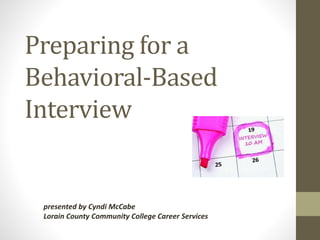
Preparing for Behavioral Interviews with the STAR Technique
- 1. Preparing for a Behavioral-Based Interview presented by Cyndi McCabe Lorain County Community College Career Services
- 3. What is Behavioral-Based Interviewing? • Many organizations are adopting this form of interviewing • Based upon the premise that past behavior predicts future success
- 4. What is Behavioral-Based Interviewing? • Systematic and professional interviewing method based on: • Determining job requirements (competencies/dimensions) • Gathering complete information about candidates relative to the requirements • Systematically evaluating the information
- 5. What is Behavioral-Based Interviewing? • Competencies are the combination of knowledge, skills, traits and attributes that collectively enable a person to perform successfully in a given job.
- 6. What is Behavioral-Based Interviewing? • A behavioral question requires a candidate to recall and describe a specific situation or event in which he or she demonstrated (or failed to demonstrate) a competency critical for success
- 7. Competency (Behavioral Based) Questions • Interviewers probe candidates for specific examples: “Tell me about a time when you…” “Describe a situation in which you…” “Describe the most significant…” “What did you do in your last job to…” “How did you address…”
- 8. More Competency (Behavioral Based) Questions • Interviewers probe candidates for specific examples: “Describe a time when you [Insert a specific task that illustrates a job-related competency]. What was the situation, what actions did you take, and what was the result/reaction/outcome?”
- 9. How to Prepare for a Behavioral Interview
- 10. Who’s the Ideal Candidate? • Study the Job Description for the position for which you’re interviewing • Visit the organization’s website to gain additional information about “fit” • List the personal and professional attributes of the ideal candidate for this job with this organization Adapted from: http://www.wikihow.com/Prepare-for-a-Behavioral- Interview
- 11. How to Demonstrate That You Are the Ideal Candidate • Think about which of your experiences can be used to demonstrate that you have these personal and professional attributes Adapted from: http://www.wikihow.com/Prepare-for-a-Behavioral- Interview
- 12. Create Practice Questions • Develop practice behavioral interview questions that demonstrate you have each of these attributes • Behavioral questions usually start with phrases like: • "Describe a time" or "Tell me about a situation“, which compel the interviewee to talk about specific experiences. Adapted from: http://www.wikihow.com/Prepare-for-a-Behavioral-Interview
- 13. STAR Response Format • Describe the Situation you were in or problem you faced • Describe the Action you took or took part in as a result • Then describe the Result of your actions. S/T A R
- 14. STAR Response Format • Spend less time on the situation and more time on Action and Results. This is what the interviewer cares about. Adapted from: http://www.wikihow.com/Prepare-for-a-Behavioral- Interview
- 15. Practice • Practice answering the behavioral interview questions you invented, using the stories you created, so your stories become second nature. Adapted from: http://www.wikihow.com/Prepare-for-a-Behavioral- Interview
- 17. How Interviewers Evaluate Data • Each dimension is rated • Try to get 2-3 STARs per competency/dimension • Effective or ineffective (“results” positive or negative) • Similarity • Impact • How recent • STAR is not provided • Example is vague, theoretical or future-oriented • Interviewee states an opinion • Missing important details of the Situation/Task, Action, or Result
- 18. Probing Questions for Incomplete STARS • Interviewers will ask follow-up questions: • when they do not fully understand a response, • when answers are vague or ambiguous • when they want to obtain more specific or in- depth information. Adapted from: http://blog.readytomanage.com/examples-of- probing-interview-questions/
- 19. Sample Probing Questions for Incomplete STARS • Situation/Task probes • Who was involved? • What factors led up to this situation? • Action probes • How did you respond? • What was your role? • Result probes • What was the outcome? • Is there anything you would have done differently? Adapted from: http://www.hhs.gov/asa/ohr/new_structured_training.pdf
- 20. Essential Interview Tips • Keep it brief • Stop talking when you’ve said enough • Listen carefully • Don’t be modest • Don’t exaggerate • If you can’t think of something work-related example, use volunteer, school, example, etc. • Speak in concrete terms • Never defend or argue • Never attempt to “invent” an example • Make connections for the interviewer
